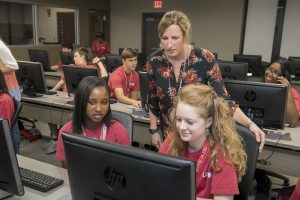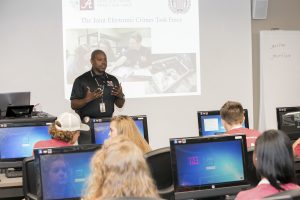
Growth is often the best indicator of a successful enterprise.
And for The University of Alabama Early College staff tasked with planning and operating the annual Leaders Exploring Academic Possibilities camp, their first signal of a thriving program was a successful pilot year in 2016 and the immediate addition of a second week of programs.
Feedback from parents, guidance counselors and the rising ninth graders that participate in the college prep program increased, too. And, despite only recruiting in the Tuscaloosa area, the program began attracting out-of-state students.
“It’s pretty exciting” that LEAP has developed a significant reach based on its reputation, said Jennifer Hayes, program manager for UA Early College.
LEAP will host the second of two summer camps in mid-July. Activities focus on academics, service and leadership.
LEAP helps its students understand the breadth of college majors and career opportunities, immersing them in various technology demonstrations and discussions with faculty and staff across campus. From theatre and dance to criminal justice and social work, UA Early College staff model the agenda for a “well-rounded thinker,” Hayes said. Students then get to choose one of the following career tracks: health care, engineering, communication, business, science or social services to combine with their service work around Tuscaloosa.
A week’s worth of on- and off-campus programming and supervision for 55 teenagers may seem daunting for just a handful of UA Early College staff members, but, similar to the African proverb, “it takes a village …,” it takes a campus to mold a college student. As such, more than 50 faculty and staff members across UA help create the agenda and execute LEAP each summer.
“Hands-on is the best way this age group learns,” Hayes said. “What we’ve done is reach out to faculty and department heads – they’re the experts. So, we’ve shared with them that the hands-on part of it is really what we’re looking for. We’ve asked the faculty lead what that looks like.
“We’ve been fortunate with faculty that have partnered for numerous years, and they’re able to evaluate what worked. We have a lunch in the spring to bring everyone in and talk through the agenda for things that work and don’t. They’ve been gracious to ask for feedback about what the students enjoyed and what they want to see.”
UA Early College staff members hope the third-year program will serve as a feeder system for its dual-credit classes and eventually lead to full-time enrollment at UA once the students graduate high school.

The future payoff is similar for other faculty and staff that participate, though each college and school has different needs and motivations.
Dr. Diana Dolliver, associate professor of criminal justice at UA, is in her third year of providing cyber criminology demos to LEAP students at the Network Intrusion Lab at Cyber Hall. The students are briefed on various programs in criminal justice and conclude with a data recovery activity, with the overarching message that “deleted is not destroyed.”
Cybersecurity has been popularized in cinema and TV, and the integration of digital devices into daily activities continues to grow the job market. But the high-tech aspects of the field are surprising to some students, Dolliver said. It is hoped that exposing LEAP students to the technology law enforcement use in real cases will help set realistic expectations about the rigors of coursework.
“There’s also a bit of a misnomer that CJ classes are easy, and we see this a bit in some of the digital forensics classes I teach,” Dolliver said. “We’re not asking you to hack into anything; we’re asking you to understand how data are stored so you can go in as an investigator and find it, and some students don’t realize how much they have to learn.”
The UA School of Social Work has a broader goal of attracting more students to its undergraduate program, a tough task given the misconceptions about the field and the myopic view of the career opportunities, said Aubrey Stewart, recruitment coordinator for the School of Social Work.
“It’s a barrier,” Stewart said. “Kids either don’t know what social work is, or they have a preconceived notion that it’s just foster care or child protective services. A lot of their questions are about career progression. We educate them on micro and macro level careers in social work, they tend to ask more questions.
“I love LEAP because we can educate them young. Many of our BSW students are junior college transfers, so being able to work with kids this young is huge for us.”
